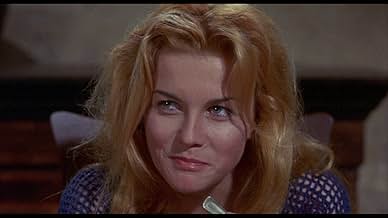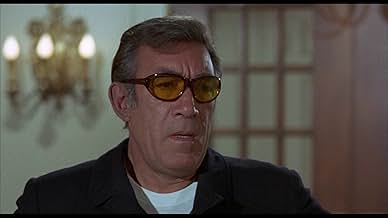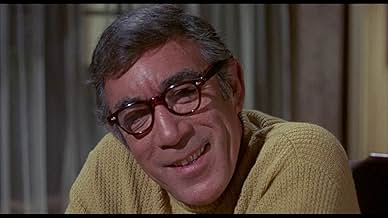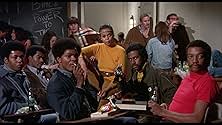अपनी भाषा में प्लॉट जोड़ेंR.P.M. stands for (political) revolutions per minute. Anthony Quinn plays a liberal college professor at a west coast college during the heady days of campus activism in the late 1960's. Rad... सभी पढ़ेंR.P.M. stands for (political) revolutions per minute. Anthony Quinn plays a liberal college professor at a west coast college during the heady days of campus activism in the late 1960's. Radical students take over the college, the president resigns, and Quinn's character, who has... सभी पढ़ेंR.P.M. stands for (political) revolutions per minute. Anthony Quinn plays a liberal college professor at a west coast college during the heady days of campus activism in the late 1960's. Radical students take over the college, the president resigns, and Quinn's character, who has always been a champion of student activism, is appointed president.
- Estella
- (as Ines Pedroza)
फ़ीचर्ड समीक्षाएं
The campus radicals, led by 33-year-old long-haired undergraduate Gary Lockwood, have occupied one of the buildings on campus, and have a list of demands. One of them is that the students should hire the faculty. (After being in academia for 40 years, I will admit they may be on to something.) Token black radical Paul Winfield also wants a black man on the Board of Trustees. When Quinn suggests a candidate, Winfield wants to know how black he is. Quinn asks if he wants a skin sample. One of the trustees points out that there are no engineering students taking part in the rebellion; just English and psychology majors. That's the extent of the hilarity in this film.
Now settle in for lots of blather and inaction, as the students accuse Quinn of being part of the "establishment." There are a couple of "right-ons" and other dialogue I could not understand. Lockwood et al finally threaten to destroy the campus computer (Lockwood is apparently still ticked off at HAL). Enter the club-wielding campus police, who, oddly, are not referred to as the "fuzz" or even "pigs." What kind of campus is this? A few skulls get cracked, butts get kicked, all this while director Stanley Kramer shoots the scenes through a blurred lens. Great. The one time we finally get some action, and we might as well be underwater. There was probably more violence taking place in theaters, as audiences rushed to the exits.
In the final scene, Quinn tells Lockwood to "stay loose, man." Then Melanie sings a song.
Anthony Quinn gives one of his finest "latter" years roles as F.W.J. "Paco" Perez. Quinn's character is a liberal fighting, social changing sociology professor who has earned the respect of the rebellious student population at his university. The students want changes now, but are unwilling to compromise. Stanley Kramer shows that there were "no easy" solutions to the various generational problems for the times. Ann-Margret is in her "sexiest" prime, but also shines as a Perez "grupie". Also, Gary Lockwood as the militant student leader gives a creditable performance.
Revolutions Per Minute is a great trip down memory lane and helps capture the atmosphere of 1970.
Anthony Quinn is a popular sociology professor of Hispanic heritage and has something of a following among the radical left on campus. When President John Zaremba just resigns in frustration because he can't deal with a bunch of students occupying the campus administration building. Quinn also has a student mistress in the person of Ann-Margret a rather open secret on campus.
The Board of Trustees decide on what they consider a master stroke, make the popular Quinn the new president because they think he can talk the radical talk and make them walk. It doesn't quite work out that way as Quinn all too well realizes that he's now part of the 'establishment'.
The students who are all too old to be playing campus radicals include spokesperson Gary Lockwood and black student leader Paul Winfield. Fine players but all showing their age. Ann-Margret is a graduate student, but even she looks a bit old to be college coed.
It ends in a scene that was all too familiar in the Sixties, police raiding the school and making arrests. At some point the students have to get back to the business of education.
Fascinating that the big threat they had was to destroy the giant computer that the college had if they didn't get their way. Now Bill Gates and the late Steve Jobs would have a fainting spell dare they suggest such a thing.
R.P.M. marked the beginning of when director Stanley Kramer started to lose his muse. It is truly truly dated.
Woodstock was in August of 1969. Altamont was in December of 1969. This means that the Woodstock Nation lasted barely four months. Elizabeth Taylor has kept husbands longer than that.
What the major studios did was get mainstream directors and told them make movies about youth in revolt. The result was movies like this which were very expensive imitations of movies that American-International had made in the sixties on nonexistent budgets.
RPM is watchable for a fine performance by Anthony Quinn. Lord, but he's a trooper. The script was obsolete before the ink dried on it. I'll be generous and say that Eric Segal's screenplay stinks. Of course, forty years later LOVE STORY doesn't get all that much love anyway.
The story centers on a Sociology professor who is picked to be president of a fictional college after protesting students occupy the administration building. The board has a late night meeting and decides to appoint Quinn president based primarily on the fact that he's sleeping with a graduate student in his department who is young enough to be his daughter.
Imagine trying to sell that to a major studio in today's Politically Correct world. Ann-Margret plays the graduate student and recognizes the script to be crap, so she has fun playing this airhead and wears ridiculous costumes and, in one scene, talks with while chewing food so that audiences won't have to understand the words she's saying.
Incredibly, this is directed by Stanley Kramer. Kramer had become a legend directing films like THE DEFIANT ONES, INHERIT THE WIND, SHIP OF FOOLS, JUDGMENT AT NUREMBERG, and GUESS WHO'S COMING TO DINNER, all of which dealt with Big Ideas from a socially progressive point of view. More importantly, they were full of characters that audiences could identify with and were fully realized human beings.
RPM is like a pageant put on by a community college Sociology department. Characters represent Sexual Freedom, Corporate Apathy, Prejudice, Sexual Liberation, Black Power, etc.
At its peak, the student revolution actually appealed to a very small per cent of students and had little support from the mainstream community. Worse yet, this film was released in the middle of Nixon's first term of office. Youthful idealism faded as more students pursued graduate studies in Business Administration.
Thanks to Turner Classic Movies for running this. I'd heard of it, but figured that Columbia Pictures had destroyed all the existing prints hoping nobody would remember it. Somehow TCM found a pristine print in excellent condition. It would have gotten just one out of ten, but I had to recognize Quinn's excellent work trying to make a dead horse run.
क्या आपको पता है
- ट्रिवियाStanley Kramer always referred to this film in interviews as his least favorite and least successful of the films he has directed.
- भाव
Prof. F.W.J. 'Paco' Perez: "Lickety split"? Where do you get your vocabulary?
- क्रेज़ी क्रेडिटAs the opening credits roll, the screen flips like a coin-like wipe with the text appearing in the center of the "coin".
- कनेक्शनFeatured in Two Sides of the Coin: The Songs and Music of 'R.P.M.' (2019)
- साउंडट्रैकStop! I Don't Wanna' Hear It Anymore
Written by Barry De Vorzon & Perry Botkin Jr.
Additional lyrics by Melanie
Performed by Melanie
Courtesy of Buddah Records
टॉप पसंद
- How long is R.P.M.?Alexa द्वारा संचालित
विवरण
- रिलीज़ की तारीख़
- कंट्री ऑफ़ ओरिजिन
- भाषा
- इस रूप में भी जाना जाता है
- R.P.M. */* Revolutions per minute
- फ़िल्माने की जगहें
- उत्पादन कंपनी
- IMDbPro पर और कंपनी क्रेडिट देखें
- चलने की अवधि1 घंटा 32 मिनट
- ध्वनि मिश्रण
- पक्ष अनुपात
- 1.85 : 1
इस पेज में योगदान दें































